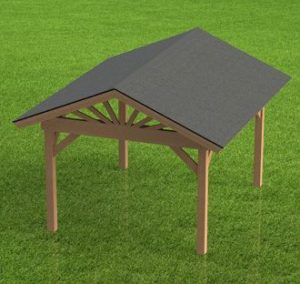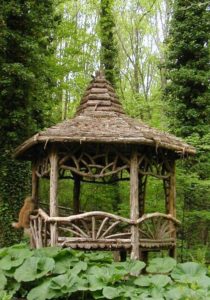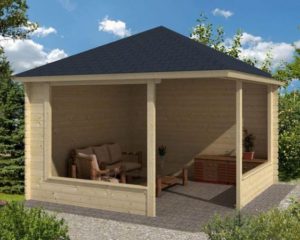A gazebos are freestanding, open garden structure, sometimes hexagonal or octagonal in shape, with a roof. Most gazebos are constructed of wood or metal and have built-in seating inside the sheltered area. To add a sense of enclosure and privacy, latticework or outdoor curtains or drapes are sometimes used. In a garden setting, a gazebo can serve as a focal point—something to be viewed and appreciated—or add protection from the sun and insects
Small cities in the late 19th century and early 20th century often had large gazebos in the town center or park, where they often served as bandstands.

History
Gazebo-like structures have been built for centuries. The Egyptians built garden gazebos to support grapes for wine and raisins. They believed that these earthly paradises—gazebos and gardens—would follow them to heaven.
Greece and Rome
Gazebos can be traced back to ancient Greece and Rome. The Greeks built temples in public spaces that were surrounded by gardens, with marble gazebos in memory of gods and goddesses.
The Romans enjoyed their private gardens as places to relax and entertain. Garden gazebos were constructed as a beautiful outdoor feature and as a gathering place.
Medieval and Renaissance Periods
While gazebos do attract attention, they also were, and still are, built to offer privacy. Elaborate gardens of churches and monasteries used gazebos as places for meditation or to establish a shrine.
TA gazebo would serve as a destination for the lord of the manor and his guests to journey outside for fresh air while still under a roof.
English Gazebos
Garden gazebos became popular in England during the 16th through 18th centuries and could be found in parks or large private estates. In the 19th century, gazebos were built for middle-class properties and also became more functional as a shelter. The English practice of afternoon tea was enjoyed in gazebos or similar structures.
Asian Gazebos

Tea houses—or teahouses—are another form of a gazebo that has been popular in China and Japan for centuries. Tea ceremonies are a time of rest, meditation, and reflection while enjoying one another’s company and admiring the beautiful surroundings of nature
Creating a Private Place

To establish a cozy hideaway on a smaller lot, add a pergola or overhead roof to your gazebo, paving, and a path leading to the area. For added privacy, create walls with lattice panels on the sides, and plant vines to grow up and over the framework.
Different than a pergola which is the pergola often has a slatted roof and is more open on the sides.
